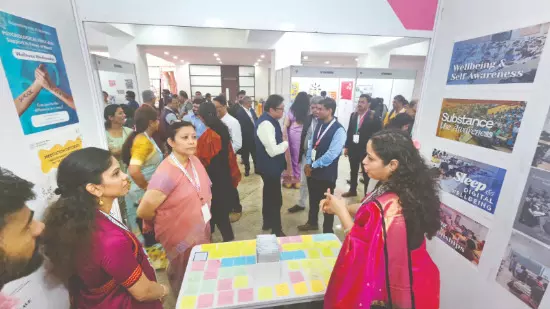Higher education institutes unite for student well-being
Second national well-being conclave held at IIT Bombay

Adolescents and youth form the backbone of India’s demographic dividend, yet their resilience is increasingly tested by academic pressures, social isolation, and digital influences. The National Education Policy 2020, the National Suicide Prevention Strategy 2021, and subsequent UGC and Ministry of Education guidelines have collectively underscored the urgent need for counselling services, inclusive campuses, and accountability mechanisms.
Mental well-being is not only a social imperative but also an economic one, as highlighted in the Economic Surveys of 2023–24 and 2024–25, which stress that a healthy student population is essential for sustaining national productivity.
The second national well-being conclave concluded successfully at IIT Bombay recently. Organised in collaboration with the Department of Higher Education, Ministry of Education, the conclave brought together around 80 Higher Education Institutions (HEIs), 115 faculty members, and 139 students. The event advanced the national agenda of embedding mental health, resilience, and wellbeing into higher education systems, building on the momentum of the inaugural conclave held at IIT Hyderabad in 2024.
The two-day programme began with an inaugural session at the convocation hall, featuring the felicitation of dignitaries and a ceremonial lamp-lighting. Dr Vineet Joshi, Secretary, Department of Higher Education, Ministry of Education, delivered remarks, followed by Prof Shireesh Kedare, Director, IIT Bombay, who delivered the opening address, and Prof Manoj Singh Gaur, Director, IIT Jammu, who emphasised the importance of institutionalising student mental wellbeing. A key highlight was the release of the “Compendium of emerging best practices of well-being across the country 2.0”, which documents replicable models from institutions nationwide.
Day 1 included a wellness exhibition, symposiums, and panel discussions highlighting counselling systems, peer mentorship networks, digital well-being tools, and institutional roles in promoting student well-being. The symposium on “The future of well-being in Indian Higher Education” discussed the evolving institutional role, while the panel on “Thriving minds: From academic growth to lifelong well-being” examined how emotional resilience can be integrated into academic and personal growth.
Day 2 began with a campus walkathon emphasising the link between physical and mental well-being, followed by breakaway workshops for students and faculty focusing on life skills, peer support, counselling competencies, and digital well-being. Student groups later showcased innovative well-being initiatives through presentations.
The conclave concluded with a valedictory ceremony chaired by Rina Sonowal Kouli, Joint Secretary, Department of Higher Education, Ministry of Education. Final recommendations and the Inter-University action plan for 2025–26 were announced, paving the way for coordinated well-being initiatives across HEIs.
The inaugural national well-being conclave, held at IIT Hyderabad in November 2024, brought together 350 stakeholders from 100 institutions and established wellbeing as a collective responsibility. Key recommendations included professional counselling systems, student representation, faculty and staff wellbeing initiatives, and collaboration with external experts. These have guided institutional reforms and align with the Supreme Court’s 15-point guidelines issued in July 2025.



